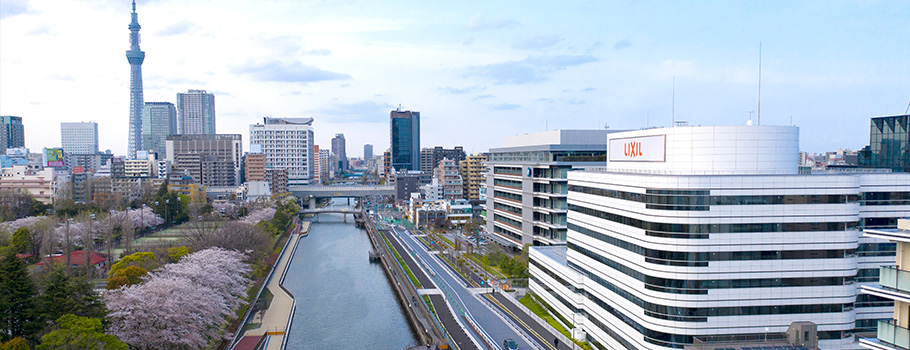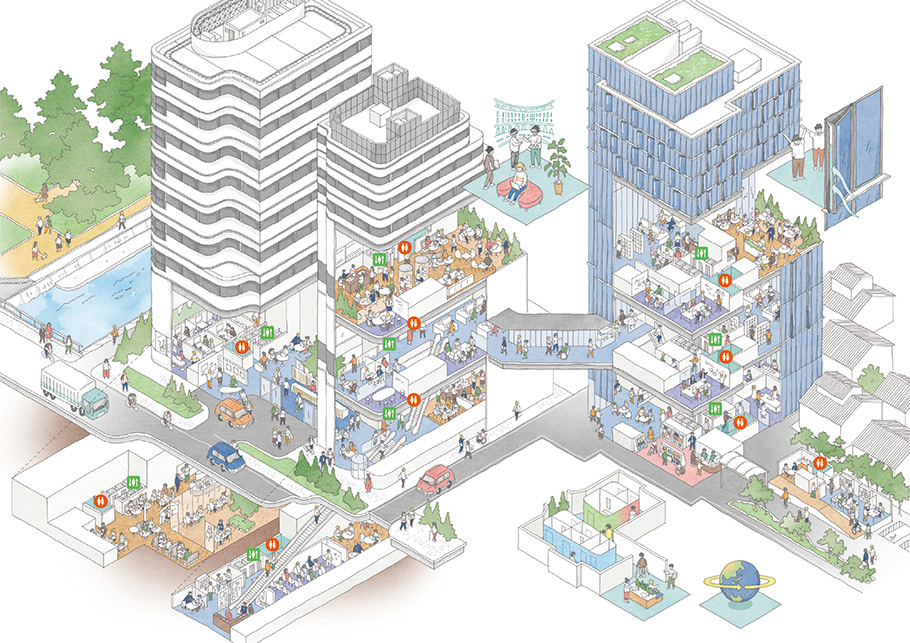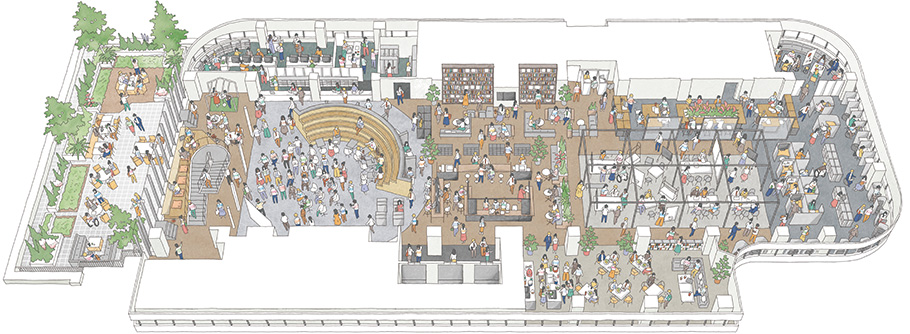LIXIL makes pioneering water and housing products that solve everyday, real-life challenges, making better homes a reality for everyone, everywhere.
- Global Site
-
- English
- Japanese
- Brand Sites
Global
- Global Site
-
- English
- Japanese
- Brand Sites

The LIXIL Headquarters has moved to a new location as of November 14 2022
Updated:Apr 23, 2020
Events in 2020 have been dominated by the unprecedented spread of the COVID-19 virus worldwide. Its impact has been profound, forcing people to change how they work and live. As of mid-April, more than 2.5 million cases have already been recorded worldwide¹. The pandemic is expected to last for the foreseeable future, and companies are again thinking about how to adjust their work policies.
In January, LIXIL set up a global task force to monitor the situation, delivering frequent updates across its internal social network and encouraging back-office employees to work from home. By February, international business travel, events, and meetings with over 10 people were suspended in Japan and many other countries. By the time the state of emergency came into effect in Japan in April, more than 98% of employees who commute to its headquarters in Tokyo were working from home. Board of Directors meetings, management meetings, press events and training programs were all convening online. This quick transition was made possible because of the journey the company has been on to transform its working style.
“The safety and wellbeing of our people comes first. This is a critical time, and when news reached us of the growing COVID-19 pandemic, I’m thankful of the fact that we already had the digital infrastructure and work policies in place to deal with it and enable most of our employees to be with their families while working,” says Kinya Seto, CEO of LIXIL.
Changing Old Habits
The coronavirus pandemic is accelerating change in the workplace, including in Japan, a country with a reputation for its traditional work culture. But changing old habits can be hard.
“We live in a very conscientious society in Japan, where showing up at the office is often symbolic, so it is just as important to nurture an entire new way of thinking about work as well as setting up the infrastructure to support it,” says Seto.
Prior to the coronavirus pandemic, commuters in Tokyo regularly brave trains running at up to 200% capacity in order to turn up to work on time, according to the government statistics². That’s just enough space to read a magazine, say officials³. Chronic overtime is also common in Japan, and in 2018 the government announced that most people were only taking half of their annual paid leave⁴. In a bid to address this, Japan passed its new “work style” reform bill on June 29, 2018. It was designed to create a fairer workplace, decrease overtime, and offer workers greater flexibility⁵.
According to the Teikoku Databank⁶, approximately 75% of large corporations are now actively engaged in reforming their work culture. Many have focused on encouraging employees to work less overtime and take more annual leave. By December 2019, however, only 7.8% of companies had adopted teleworking capabilities and the use of satellite offices, making the sudden transition difficult when COVID-19 hit. In fact, according to a survey conducted by the Ministry of Health, Labour and Welfare using communication app LINE, only 5.6% of respondents were teleworking⁷.
Changing LIXIL’s Working Style
LIXIL’s global headquarters looks out over the quiet Yokojikken River, located in the east of the bustling Tokyo metropolis. Befittingly called WING, it is a place designed to help new ideas take flight.

LIXIL WING, Global Headquarters (Ojima, Tokyo)
“The new WING is all about enabling people to work more collaboratively, comfortably, and flexibly. Our employees are the ones who carry out our strategy, provide for our customers, and create value for society. They are our greatest source of competitiveness and growth, and we wanted to create a central hub that would inspire and support everyone,” says Jin Montesano, Chief People Officer of LIXIL.
LIXIL consolidated its global headquarter functions in its overhauled WING campus in November 2019. Four years in development, it consists of four buildings, including the newly raised Hoshi –“star” – glass structure. With a capacity to accommodate over 5000 people, it is also home to a new R&D facility, design center, and spaces that encourage open communication and new ways of thinking. The campus even includes an entirely new concept of a public bathroom that can be used by anyone, regardless of gender or physical ability.
Hirameki –“inspiration” – is one such place. Covering an entire floor, it includes spaces for individuals to concentrate or groups to brainstorm. A Romanesque semi-circular theater sits on one end for speakers to unveil their findings, as well as a library and resting area.

Hirameki is an entire floor dedicated to encourage employees to explore working styles
“We strongly believe in our employees experimenting and trying new ideas. But an enabling workspace is only half of the story. We’re all individuals with different lifestyles, after all, who perform better under individual circumstances. Transforming LIXIL’s ways of working is very much also a digital story,” says Montesano.
Digitalizing LIXIL’s employees
LIXIL began its own companywide work-style reform initiatives in Japan in 2017 to bring it on par with global standards. At first, it provided the right to work from home to employees who are pregnant or raising children. Following pilots in various departments, it soon extended its work-from-home policy to all employees as part of implementing more flexible working styles. Now, all employees have the right to telework from satellite offices or from home up to five days a week to suit their professional responsibilities and lifestyles.
To support its transformation, employees in Japan were also given the right to manage their flextime, helping them to cater to their individual lifestyles, including for those who have to care for their families.
The company also introduced new digital tools to enable its global workforce to stay connected. Workplace was selected as an official social network for all employees worldwide, while workers were also given access to video conferencing tools such as Zoom. Many of its town hall meetings- including Seto’s - are now held online.
Today, LIXIL is the largest company in Japan actively using Workplace. In March, over 90% of claimed accounts became active, with the number of Workchat exchanges at record high in April, reaching over one million. Zoom meetings are increasingly starting to replace physical ones, increasing from approximately 7,500 in December to 31,500 in April. Leaders are now conducting interactive Q&A sessions over Zoom to engage employees, while showroom staff are also experimenting new ways to continue serving customers remotely.
“We’ve undergone a digital transformation at LIXIL, and just like our renewed WING campus, I believe this will enable our people better. Everyone has different needs, and by basing our HR policies to meet them, I believe our people can be more efficient with their time and feel better about what they do. Great ideas are just as easily born online,” says Montesano.
But Montesano and Seto also believe there is still a lot of work to be done, made clear by the current pandemic.
Looking ahead, Seto adds, “While many of our employees are working from home now, spending time with their families, we know that there are jobs that also cannot be done remotely. As a maker of housing products, we are doing everything we can to protect our showroom and factory workers at a time when hand-washing facilities and other sanitary products are most needed, while helping people at home live comfortably and healthily. We have made significant strides in how we work at LIXIL, but as this crisis has shown, we have to continually revisit our responsibilities to make sure we are there to help our people and society.”
¹ John Hopkins University and Medicine Coronavirus Resource Center (link)
² Ministry of Land, Infrastructure, Transport and Tourism (link)
³ Ministry of Land, Infrastructure, Transport and Tourism (link)
⁴ Ministry of Health, Labour and Welfare (link)
⁵ Mercer (link)
⁶ Teikoku Databank (link)
⁷ Ministry of Health, Labour and Welfare (link)
Our Stories
- Backing People and Passions to Drive Innovation
- How Toilets in Schools are Catalyzing Change in Communities
- Building the Future by Recycling the Past
- Reinventing Consumer Connections in the World's Largest E-commerce Market
- Tackling Household Water Inefficiency in a Water-Stressed World
- Plugging the Plumber Shortage
- Pioneering Solutions to a Sewage Crisis in Rural Alabama
- Meet the Citizen Developers Changing How We Work
- Design and Brand Identity Transformation at LIXIL
- Three Changes to Prepare Europe’s Sanitary Industry for Growth
- Three Steps to Creating an Inclusive Culture
- From Linear to Circular: Giving Products in Your Home a New Lease of Life
- Crafting Unique Experiences as well as Products
- GROHE X: A Digital Brand Experience
- Design-led Innovation Delivering True Value
- Responsible Use of Plastics
- Empowering our People for an Agile Future
- Turning the Waves of Change into Opportunities
- SATO Tap: a New Handwashing Solution for All
- New Ways of Working Take Flight at LIXIL
- INAX: Rituals of Water
- Refreshing our sanitation targets, standing firm on our commitments
- Developing Attractive and Differentiated Products
- Conserving Water: The New Normal
- Insulating For a Warmer and Healthier Home
- Open Kitchen, Open Communication
- Tackling Open Defecation in India
- Shaping the Future of Faucets, One 3D Layer at a Time
- Bathed in Culture and Tradition
- Remodeling the Housing Market
- LIXIL's AQUA CERAMIC makes bathroom stains a thing of the past
- The Technology of Water
- Tackling Challenges in Global Sanitation and Hygiene
